#Black American Freedmen
Text
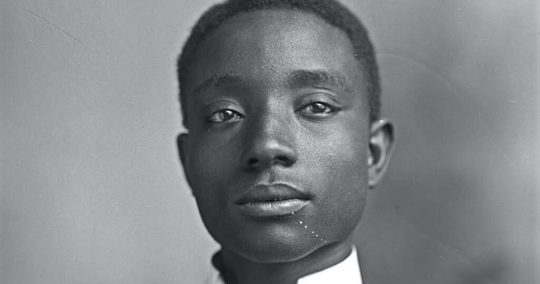
Freedmen Seek Their Fair Share of Billions of Dollars in Federal Aid and Why We Should Care/Rise UP and Support Them
By Eli Grayson
Eagle Guest Writer
Eli Grayson is a Creek Citizen and unabashed supporter of the Freedmen descendants of the 5 Civilized Tribes and the 1866 Reconstruction Treaties.
This past week, we celebrated our Nation’s 244th year of Independence with family and friends over BBQ and fireworks, we should all stop to reflect on its significance, particularly in light of the Black Lives Matter (BLM) movement.
The protests that have swept the country by those outraged over the death of George Floyd, Breonna Taylor, Ahmaud Arbery, and far too many others, most of whose names have not garnered national attention, has sparked a long-overdue National dialogue about the treatment of Black Americans in the United States, a reckoning with this country’s past, the many vestiges of slavery that continue today, and what we as a country can and must do to address racism. [It also reminds ALL of us that we have a long way to go.]
Not only have the egregious deaths of George Floyd, Breonna Taylor, and Ahmaud Arbery led to a growing chorus of voices calling for criminal justice reform, it has prompted many to reflect upon racism in both its subtle and overt forms today. It has prompted many to learn about events long celebrated by Black Americans such as Juneteenth (even the NFL recently recognized Juneteenth as an official holiday). And it has prompted many to consider what steps we as individuals, and as a society, can take to affirmatively address it. Here in Oklahoma, attention has focused on Black Wall Street and the 1921 Tulsa Race Massacre.
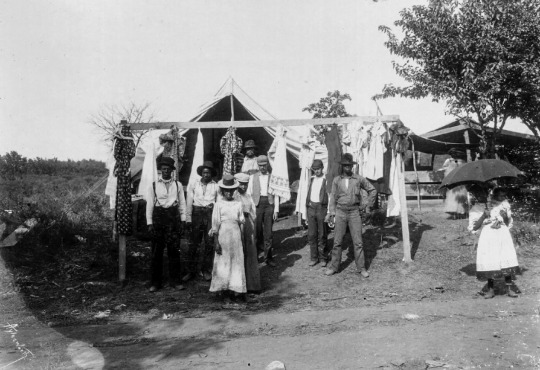
Well known is the U.S. Government’s abhorrent treatment of Native Americans, which included abrogation of countless treaties, appropriation of land, and forced removal to Western territories, including what is today Oklahoma.
Less well known, however, is the fact that the Cherokee, Chickasaw, Choctaw, Muscogee (Creek) and Seminole Nations – collectively known today as the Five Civilized Tribes – enslaved Africans. Like Southern plantation owners, they bought and sold slaves and treated them as chattel property. Indeed, slaveholding was such an integral part of the daily life of these tribal nations that each entered treaties with the Confederate States of America in 1861 to ensure its continuance.
Many Americans recently learned for the first time about the meaning and significance of Juneteenth, when nearly all remaining slaves in the United States and its territories were freed – a full 71 days after Confederate General Robert E. Lee surrendered at Appomattox on April 9, 1865 to Union forces led by General Ulysses S. Grant.
Enslaved Africans of Indian Territory
This was not the case for the enslaved Africans of Indian Territory. Even after Lee’s surrender, and even after General Granger read his Orders, the enslaved Africans of Indian Territory were kept in bondage.
Sadly, it was not until the Five Tribes of Indian Territory entered Treaties with the U.S. Government on March 21, with the Seminole Nation, on April 28, with the Chickasaw and Choctaw Nations, on June 14, with the Muscogee (Creek) Nation and on July 19, with the Cherokee Nation in 1866 – more than a year after Lee’s surrender – were these slaves granted freedom, tribal citizenship, and equal interest in the soil and national funds.
Each of these treaties (collectively known as the Treaties of 1866) contained provisions freeing the slaves and an express acknowledgement that the U.S. Constitution was, and shall remain, the Supreme Law of the land. Notably, there was no mention of tribal law or sovereignty insulating these slave holding tribes from full compliance with the U.S. Constitution, which includes all the Civil War reconstruction amendments.
Today, we find ourselves at a turning point in society. Similar to the country as a whole, the Cherokee, Chickasaw, Choctaw, Muscogee (Creek), and Seminole Nations must take this seminal moment to carefully examine their slaveholding past, their prior allegiance with the Confederacy, enshrined through Treaties entered in 1861, and how they can make amends by fully adhering to both the letter and spirit of the 1866 Reconstruction Peace Treaties.
Congressional legislation
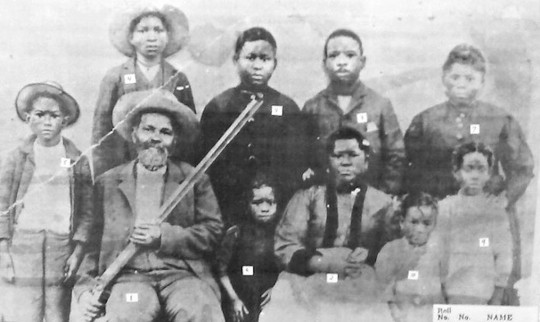
The three House bills are H.R. 2, the Invest in America Act, which includes $1 billion for the Native American Housing Block Grant Program to create or rehabilitate over 8,000 affordable homes for Native Americans on tribal lands; H.R. 6800, the HEROES Act, which includes $6 billion for housing and community development to respond to the Coronavirus; and H.R. 5319, the Native American Housing and Self-Determination Reauthorization Act (NAHASDA), which would authorize $680 million in grants to tribes in the first year and grow to $824 million in the fifth and final year.
Why is this important and why should you care? NAHASDA was originally passed by Congress in 1996 to address poor housing conditions in Indian country and last re-authorized in 2008. It is a flagship Federal law for Native American tribes and the vehicle through which approximately $650 million flows annually to the tribes. In Oklahoma, the Five Civilized Tribes receive more than $62 million annually in direct grants for housing and community development projects. These grants are based on a formula that takes into account various factors including the number of tribal members. Notably, these grants are supported by taxpayers.
For the 2021 Fiscal Year, the U.S. Department of Housing and Urban Development (HUD), which is responsible for administering NAHASDA, has informed the Five Civilized Tribes that they can expect to receive $62,223,462. Thus, nearly 10 percent of all NAHASDA grant funds will go to just these five tribes. By any measure, this is a significant sum, particularly when you consider that there are approximately 573 federally recognized tribes in the United States today, according to data from the federal Bureau of Indian Affairs. And, the final amount will be even greater as Congress has (appropriately) increased the amount of funds for NAHASDA far above the amounts requested by this Administration, including an appropriation of $825 million for this Fiscal Year.
Oklahoma Tribes receive millions in housing aid
Native American Tribes also receive other competitively awarded grants from HUD through a program known as the Indian Community Development Block Grant program. The Choctaw Nation was recently awarded $900,000 to rehabilitate 60 single-family homes while the Cherokee Nation received the same sum to construct a community building, which will house the Early Head Start program. The Chickasaw Nation was awarded $900,000 to construct a youth center in Ardmore, Oklahoma that will provide a safe and clean place for activities and services for Chickasaw tribal youth while the Muscogee (Creek) Nation will use its $900,000 award to construct a facility on the campus of the College of Muscogee Nation. The facility will include space for exhibitions and a lecture hall. These are worthy projects and it is vital that all those in need, including Freedmen descendants, can benefit.
Why Freedmen are concerned
Now if you have read this far, you must be thinking this is great news for these five tribes. And indeed, it is. However, for the Freedmen who are de facto members of the tribe, they may never see a dime of these funds if history is any guide.
Steps such as conditioning or denying the issuance of Citizenship Cards to Freedmen descendants, as well the disenrollment of Freedmen as tribal citizens, is what first led Congress in 2008 to include language in the NAHASDA re-authorization bill to link the receipt of NAHASDA housing grants to compliance with the treaty rights and benefits conferred on the Freedmen through the 1866 treaties.
That is why the efforts of House Financial Services Committee Chairwoman Maxine Waters, D-California, to fight on behalf of the Freedmen of all Five Civilized Tribes is so vital.
The committee she chairs oversees HUD and is responsible for periodically re-authorizing NAHASDA. A bi-partisan bill introduced in Congress last December would re-authorize NAHASDA. However, unlike the 2008 legislation, which contained language to prevent the Cherokee Nation from denying Cherokee Freedmen under the Act, the bill introduced by Rep. Denny Heck and co-sponsored by Reps. Scott Tipton (R-Colorado), Ben Ray Lujan (D-New Mexico), Tom Cole (R-Oklahoma), Deb Haaland (D- New Mexico), Don Young (R-Arkansas), Rep. Gwen Moore (D-Wisconsin), and Rep. Tulsi Gabbard (D-Hawaii), does not contain any protections for the Cherokee Freedmen nor the Freedmen of the other Civilized Tribes. Similarly, the version introduced in the Senate last week is devoid of such protections for the Freedmen.
Disturbed by the pattern of denying benefits to Freedmen, Chairwoman Waters is seeking assurance that descendants of Freedmen are not denied NAHASDA funds received by the Tribes. The Descendants of the Freedmen of the Five Civilized Tribes have been working to include language that would ensure that the Freedmen of all Five Civilized Tribes receive taxpayer funded NAHASDA benefits. A similar effort advanced by former House Financial Services Committee Chairman Barney Frank was successful and helped to ensure that Cherokee Freedmen received NAHASDA benefits. And in case, any question whether such protections were needed, one look only to the fact that HUD held up NAHASDA funds to the Cherokee Nation for noncompliance.
Native Americans keep fight against Freedmen
Given the harsh treatment of Native Americans at the hands of whites, one naturally would expect these Five Tribes and their supporters and defenders to be more sensitive to the plight of Freedmen who today make up more than 200,000 descendants.
The reality has been quite the opposite.
Despite knowing all this, tribal leaders and their supporters and defenders continue to maintain that such language is not needed and further argue that such language infringes upon the sovereign rights of ALL Native American tribes.
Both arguments could not be further from the truth.
Language ensuring that the Freedmen have access to federal housing benefits is urgently needed for the very reason that Freedmen have routinely been denied NAHASDA benefits for years. And let’s be clear – language we are seeking does not apply to ALL tribes, but rather only to the Freedmen of the Five Civilized Tribes.
And it does not stop at NAHASDA benefits. Freedmen have been denied tribal citizenship, benefits, and the right to vote as well. Regarding sovereignty, these are federal taxpayer dollars – as such, the federal government and, by extension, its American citizens, have a vested interest in ensuring that all tribal members, including Freedmen, benefit from the funds appropriated pursuant to NAHASDA.
If tribes feel so strongly about their sovereign right to continue to discriminate against Freedmen through denial of federally funded benefits, they can opt to refuse the funding, which would then be redistributed to other tribes. Indeed, it is the height of hypocrisy for any of the Five Civilized Tribes or their supporters to makes these arguments as they count the Freedmen when it comes to the allocation of federal housing grants from HUD yet turn around and deny those very same Freedmen from receiving such benefits.
Freedmen are equal, lawful Tribal citizens
And don’t be mistaken. While Freedmen should be treated as equal citizens under the respective 1866 Treaties, the language we are seeking to include in each of these three bills carefully avoids this ensuring Freedmen receive taxpayer housing and community development benefits on the same terms and conditions as their Native American sisters and brothers.
Indeed, in many instances, these truly are their sisters and brothers given the extensive intermixing of Freedmen and By Blood tribal members over the years. Ironically, this has resulted in some members of a family being considered by the Five Tribes as Indian and therefore citizens of the Tribe while other family members being considered by the tribe as non-Indian and therefore like black sheep.
Yet every time we make a further legislative concession and are led to believe that we are close to a final agreement on language, the Tribes and their supporters and defenders move the goalposts. Sound familiar? Yes, a sensitive issue. The Freedmen only seek to ensure that the Five Civilized Tribes comply with the Treaties of 1866.
Tribal Nations’ actions throw shade on BLM
Lastly, the Five Civilized tribes cannot have it both ways. They cannot on the one hand claim they are victims of discrimination and participate in BLM rallies yet discriminate against Freedmen by denying them suffrage and other rights of tribal citizenship under the guise of sovereignty.
And we are under no illusion that fighting this battle for justice and equality will not remain a challenge. The Five Civilized Tribes have wielded their extensive influence amongst the Nation’s 573 tribes to frame the debate and shape the position of the National tribal organizations in Washington, whom the Members of Congress look to when writing laws that affect the tribes. Adding to the challenge is the fact that the Five Civilized tribes have deployed their sizable resources to contribute to key Members of Congress with the dual purpose of keeping Americans in the dark about their slaveholding past and ensuring that these legal protections for Freedmen never see the light of day in Congress.
But just like our Nation, it is time for the Five Civilized Tribes to stand up and confront their past by taking immediate and affirmative steps to ensure that all descendants of Freedmen receive the federal housing benefits.
This they can do by supporting legislation being courageously advanced by Chairwoman Waters that would require the Five Civilized Tribes to both comply with their Treaty obligations of ensuring access to benefits for Freedmen and report on their compliance to Congress.
Featured Image (Top), Buck C. Franklin, Nashville, Tennessee, 1899, Calvert Brothers Studio Glass Plate Negatives Collection, The Tennessee State Library and Archives Blog
#Black Lives Matter for Freedmen Descendants of the Five Civilized Tribes#Black American Freedmen#Freedmen#indians#slavery
105 notes
·
View notes
Text
https://x.com/VannMarilyn/status/1703090084096905379?t=7nVk4_--n5WfM5oSBPRqPA&s=09

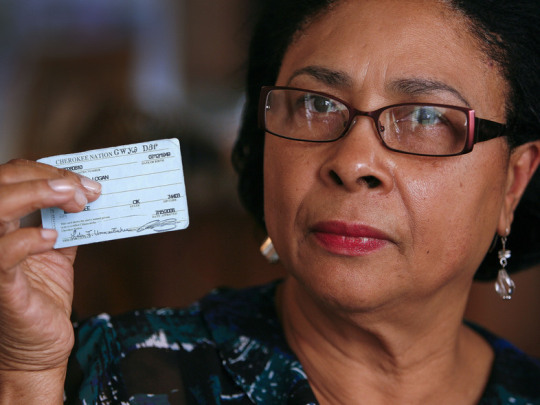
The Federal Indian Blood Quantum Fiction
The Great Vanishing Act: Blood Quantum and the Future of Native Nations, Vol. 2, Fulcrum Publishing, (Forthcoming)
12 Pages Posted: 14 Sep 2023
Gabriel Galanda
Galanda Broadman
Date Written: September 11, 2023
Abstract
Indian blood quantum is a fiction. It is made up. It is fake. It is pretend. It began as colonial racial fiction. It morphed into federal legal fiction. It now exists as widespread tribal political fiction. It is and always has been fictional that certain percentages of “Indian” or other racial blood run through Indigenous people’s veins.
Human blood simply cannot be reduced to fractions or decimal points based on racial definition. That idea has been found to lack “intellectual credibility.” The Indian blood quantum fiction is nevertheless enshrined and codified in United States law, as it has been for centuries.
That fiction permeates numerous nineteenth century Treaties and twentieth century federal statutes, which have decimated Indigenous land tenure and kinship systems and assimilated Indigenous people. That fiction also exists in the enrollment laws of at least seventy percent of the Native nations recognized by the United States. Following federal law, Native nations have adopted fictional Indian blood quantum as their own norm.
To perpetuate that fiction jeopardizes Native nationhood writ large. This essay is intended to explain the continuing imperialist, assimilationist, and terminationist aim of federal Indian blood quantum laws so that Native nations might consider and adopt alternative citizenship criteria. At minimum, any metric for Indigenous national belonging should be rooted in kinship, not race—and in truth, not fiction.
#The Federal Indian Blood Quantum Fiction#Cherokee#Bloodlines#Freedmen#Assimilation#Fiction and Lies#cherokee tribe#Black American Freedmen#tribal membership
4 notes
·
View notes
Text
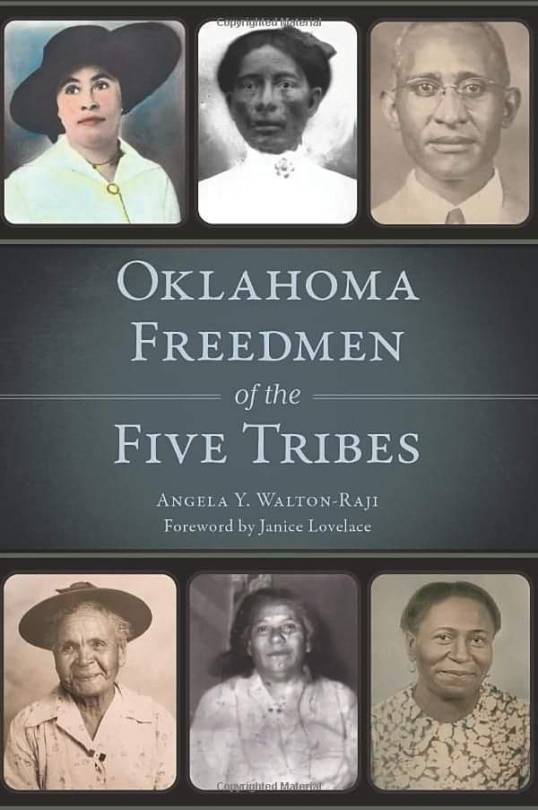
My family Chickasaw Freedmen.
#chickasaw freedmen#black history#black tumblr#native american tribes#black literature#native history#black community#black history is american history#native american history#native americans#black lives matter#american history
235 notes
·
View notes
Text
How genealogy is used to track Black family histories
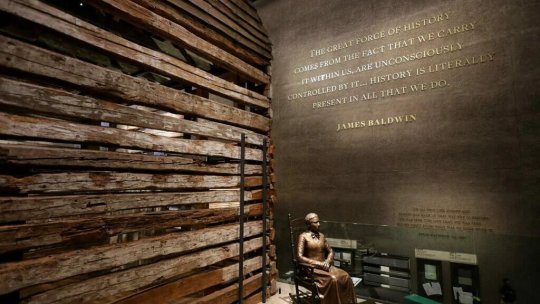
Our names are important to us. They tell us who we are and often, who we come from. So imagine suddenly discovering the last name you’ve always carried… might not actually be the name you should have.
Alex Neason began looking into her family’s history after discovering her great grandfather’s name was different from what she believed for her whole life. In her search to discover the story of that last name, she enlisted genealogist Nicka Sewell-Smith.
For Black Americans, genealogy can fill in the blanks left by the legacy of slavery and racism in the U.S. Services like the Freedmen’s Bureau and Slave Voyages provide free access to records and documents to help with that search. We talk about the power of genealogy in fostering knowledge and connection for Black Americans.
Source
If you click on the word “source,” it’ll take you to the article where you’ll see a LISTEN button. It’s a 30-minute audio that discusses the info provided in the article even further. Y’all know I’m big on getting people to trace their lineage. All that “we don’t know where we come from.” Who told you that? Everything in the US is in plain sight. Everything.
Discover your fam.
I assist others when they reach a roadblock, like getting past the “1870 wall.” But you can’t beat the feeling of you discovering them on your own. Unearthing your history, seeing photos, reading stories that were stored, and saying their names that haven’t been said for centuries. I’ve been tracing mine (scanning, logging) since my family reunion in 2005 through oral family history and obituaries (those are records), and since 2011 through databases of US archived records like ancestry.com (purchased by BlackStone) and familysearch.org (free database owned by the Latter-day Saints Church). There are others, but those are the main two I use for comparative results.
Archiving Centers, Census Records & Other Records
There are archiving centers in every state and DC that also keep records for those particular states and the federal capital. There’s a footnote on all records that tells you where they are housed. And please...Don’t just do a simple pedigree chart of your family tree. Get to know your great-aunts, great-uncles and cousins. It’s also helpful for seeing who lived around who (fam often lived next door to each other) and puts more of the pieces together of your complete family story. You can see the land and acres they owned or your fam today still owns, as well as if that land was stolen from them.
US census records go back to year 1790. Depending on when or if your ancestors were enslaved or free: you’ll find them attached to slave logs that have been made available online or kept in archiving centers (you go there), or or they’ll be listed on census records as free persons (1790-1710), free colored male/female (1820-1840), Black (1850-1920), Mulatto (1850-1890, 1910-1920) or Negro (1900, 1930-1950). “New” census documents are put on sites, like ancestry.com, every 10 years. As of 2023, you can only trace from 1950 to 1790. The 1960 census will be out in 2030. How to trace from 1950 to today, birth, death and residential records. So again, depending on the census year, you’ll notice your ancestors racial classification change throughout documents for obvious reasons.
Keep in mind that the the largest slave trade for the United States was the domestic slave trade. In house human trafficking and selling (in addition to property insurance of enslaved people and the selling of enslaved people as the building block of Wall Street’s stock exchange) is how US capitalism was built. So just because you know a lot of your people are from Tennessee, for example, it doesn't mean that’s where that line stayed. I’ve found my ancestors throughout 7 states (so far). Another example, people with Louisiana roots damn near always have ancestors who were trafficked from early Virginia. Going beyond year 1790, records were kept in Christian and Catholic churches and old family history books so most of those documents are scanned online and/or still kept in the churches. I’m talking books books.
If your ancestors walked the Trail of Tears, or were caught as prisoners of war or trafficked to Indian Nations to be enslaved, you’ll find an Oklahoma Indian Territory and Oklahoma Freedmen Rolls section on ancestry.com. You can discover more info on sites, like the Oklahoma Historical Society. (Every state has its own historical society for archived genealogical records.)
Here’s the National Archives.
Also for Oklahoma, you may also find your ancestors in Indian Census Rolls (1855-1940) as [insert tribe] Freedmen, depending if they weren’t rejected through the “blood quantum” Dawes Rolls for not being the new light to white status. You’ll see their application and the listed questions & answers with or without a big void stamp. And on the census, you’ll even see the letter I (pronounced like eye) changed to the letter B. This is also for those in Louisiana.
Freedmen’s Bureau & Bank Records
There were Freedmen’s Bureau records and Freedman’s Savings Bank records in other states. To see if your ancestors had their records in those systems, you can search by their name. The state and age will pop up with people having that name. It’ll give you a wealth of other info, like all of the kids and other fam if they were present or mentioned to the person who logged that info in. With the Freedmen Bank records, you can see how much money your ancestors put in there (that was later stolen from them by way of the United States government), which is still there today. It’s the biggest bank heist in US history (that they try to keep hush hush) with the equivalence of more than $80 million in today’s value stored in there today. Back then, it was valued almost close to $4 million. Stolen wealth met with bootstrap lectures.
Here’s a short video on that heist:
youtube
Today the bank is called the Freedman's Bank Building, located right on Pennsylvania Ave. Plain sight.
Trace your lineage.
There’s a lot more that I can list. But this is just the basics. Like I said before, it’s a more rewarding feeling when you discover your ancestors by yourself. You may reach roadblocks. Take a break. Try going the “Card Catalog” route on ancestry.com’s search engine. Don’t skip the small details.
SN: Slave Voyages isn’t a genealogical site, but rather a database for slave ship logs and the estimates of purchased Africans who became human cargo to be enslaved by country like USA, or by colonizers like Spain, Great Britain, etc.
#black americans#genealogy#lineage#ancestry#census records#freedmen's bureau#freedman's bureau#freedmen's bank#freedman's bank#american heist
130 notes
·
View notes
Text
#our race#race#black#ebony#negro#negrito#swarthy#moor#enslaved#freedmen#africa#caribbean islands#caribbean#south america#central america#indigenous#indigenous to the world#native#native americans#indigenous people#indigenous history#first nations#afro latinas#afro latinos#one drop rule#our land#racism#discrimination#classism#oppression
52 notes
·
View notes
Text




Juneteenth is coming up! A Texas originated holiday for Black Americans w/lineage to American slavery.
Acceptable flags are
• Black American Heritage Flag
• Juneteenth Flag
• American Flag
#juneteenth#black history#black tumblr#black love#texas#galveston#the south#black family#black culture#black americans#freedmen
6 notes
·
View notes
Link
The pressing issue was land. In the post-Civil War years, Black-freedom advocates such as Edward P. McCabe proposed flooding Indian Territory with Black towns, establishing the demographic foothold for a future Black-majority state. As the chronicler A. G. Stacey wrote at the time, “There is a secret political society in existence . . . which is based upon the principles of Negro advancement, mentally and morally, and the future control of Oklahoma whenever it shall become a state.” The creators of such plans were blind to the concerns of Indians and did not hesitate to align Black and white settlers against them. Frederick Douglass assured a crowd in 1869, “The negro is more like the white man than the Indian, in his tastes and tendencies, and disposition to accept civilization.” Where the Indian “rejects our civilization,” he went on, “it is not so with the negro. He loves you and remains with you, under all circumstances, in slavery and in freedom.”
Gayle is not wrong to name Claude Cox and Alexander Posey as anti-Black racists. The more interesting question, however, is how their racism was shaped by concerns for their people, their polities, and their dwindling land. At the Sequoyah Constitutional Convention of 1905, several tribes sought to establish an Indian state from Indian Territory, bringing a petition to Congress that was swiftly rejected. The secretary to that convention was Posey, a complicated, sometimes contradictory thinker who was devoted to the politics and the aspirations of his tribe. To see his racism clearly is to see a desperate collision between the ambitions of Black and Native peoples.
....
When it comes to belonging, two cultural problems intertwine. Black Creek claims to Creek identity—at least in Gayle’s account—tend to be genealogical, full of blood essentialisms, and sometimes disengaged from the ongoing vitality of Muscogee culture. Figures such as Jake Simmons, Jr., for instance, seem to care most about leveraging Black success out of Native citizenship, leasing and selling Creek land to corporations. At the same time, the historically rooted culture of Muscogee anti-Black racism is not merely abhorrent but unsustainable, offering no path to the future for anyone involved. When it comes to citizenship, two political problems intertwine. Native sovereignty, in the American context, rests upon the legal authority of treaties. So, too, do Black rights to Native membership. The various arguments about Native identity bounce between cultural ties and political claims, all exuding moral authority but none fully authoritative. In this sense, one of Gayle’s maxims proves compelling: Black Creek stories, rich with both the subtleties and the crudenesses of America’s racial history, force us all to contemplate new forms of reckoning.
#this article is crazyyyy good#it provides a great perspective on slavery in the civilized tribes; ongoing conflicts over tribal membership; and is not overly simplistic#the more that we talk about slavery in the civilized tribes and discrimination against freedmen in these tribes the more the issues gets#shoehorned into the afropessimist perspective#even when people attribute the conflict to white supremacy#and yes. although beneath white supremacy is capitalism and forced scarcity#not to mention nationalism and nation state politics#but my point is always. always. that history never actually fits into the narratives we create to understand it#just like the present doesn't#its hard to avoid essentializing issues because you want to have a moral center and you want to comprehend something#especially through the lens of current politics and social organizations#and our historical foundation literally has taught us to look at american society as divided into a hierarchy#that roughly goes white/east and south asian/everybody else/brown latinos/natives/black people with natives and black people sometimes#reversed#and then we operate with the idea that someone is always on the bottom and someone is always on the top#and that oppression is the product of individuals all together choosing to hurt others for their own gain#or that certain elites use various oppressed people like marionettes to do their bidding#white elite rich elite whatever#and that oppression is a sliding scale based on how much you are oppressed but also how you are used to or on your own will oppress others#but there is not a single group in america that has not contributed to the oppression of another#not to say of what we do to people in the third world#none of our hands our clean and we are not ‘innocent’#but the vast majority of us are oppressed and suffering in one way or another#and any liberation will be by for and with all of us#yeah
34 notes
·
View notes
Text
Before Juneteenth comes to a close, let's not forget to honor our ancestors, all of the American Freedmen soldiers who fought and died in the civil war(despite this country always trying to downplay the major role Black people played in the civil war) as well as the Gullah Geechee Maroon rebels (Gullah War. The longest war fought on American soil) who also fought to end slavery and whose efforts placed an even greater pressure on the American government to end slavery and thus helped spark the civil war.
This day is nothing without our ancestors. We should use it to honor their memory, their sacrifice, and courage. We should also use this day to encourage all of us to continue to fight for equality, equity, and the restoration of our people: economically, politically, academically, culturally, socially, etc.
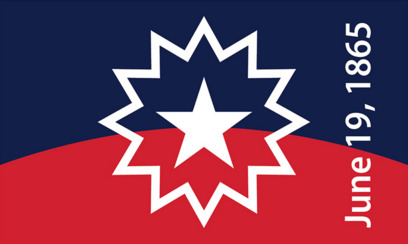
#black pride#black people#black history#juneteenth#june 19#black lives matter#equality#reparations#reparations for slavery#american history#american freedmen#gullah geechee#gullah wars#american wars#history#civil war
6 notes
·
View notes
Text
My Introduction
A Walk Down Memory Lane
#black americans#african america history#black business#buy black#shop black#credit#black community#civil rights movement#black history#black excellence#ADOS#Freedmen#financial freedom
9 notes
·
View notes
Text
Tulsa's Black History Saturday School
Ribbon cutting at Tulsa’s EduRec Youth Center for Black History Saturdays. Credit: Black History Saturdays
2021 marked the centennial of the Tulsa Race Massacre – a horrific attack white people waged against Greenwood, a once prosperous Black neighborhood in north Tulsa, Oklahoma. Also in 2021, state legislators passed a law that limits how race is discussed in classrooms.
Tulsa activists say HB…

View On WordPress
#ACLU#African-american#Amy Gastelum#Anti Critical Race Theory#black history month#Community Education#Education Gag Order#Education policy#Freedmen#GREENWOOD#HB 1775#jina chung#Making Contact#Midwest#OKLAHOMA#racism#radio project#Saturday School#TULSA#Tulsa Race Massacre
0 notes
Text
Black Amusement Park Suburban Garden(Washington DC) was once a big deal. Unfortunately, this park would be put out of business due to integration. DC Black Freedmen Stand Up!
-
Black American freedmen never fled for a better way of life or was ever given a hand up. We always worked for everything we had and stood ten toes down to WS. Situations like this, our towns being under highways, lakes, generational wealth stolen, and more makes the Black American freedmen experience extremely different from from everyone else.
-
This is why I correct and check anybody who come on here, making it about them or speaking so freely on our freedmen experiences. I have a firm understanding that someone being nice to me (and I’m still kind to everyone) does not mean they are friend and that my people have not lost generational wealth. I don’t care how friendly one is or act as if they are down. You are no ally if you don’t understand that Black American freedmen can have something to themselves.
-
Please remember God never intended for us to be fools. White supremacy did. Suburban Gardens everyone!
395 notes
·
View notes
Text
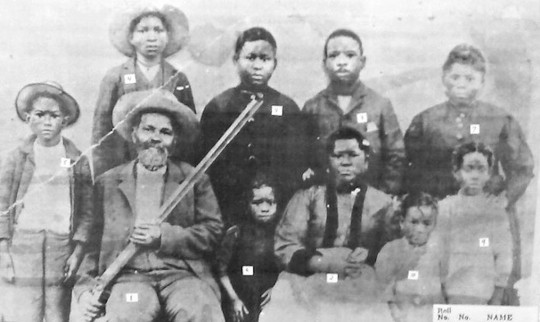
Black Lives Matter for Freedmen Descendants of the Five Civilized Tribes
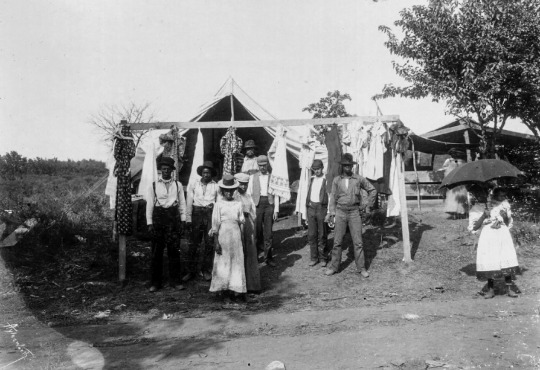
#Black Lives Matter for Freedmen Descendants of the Five Civilized Tribes#Black American Freedmen#Freedmen
21 notes
·
View notes
Text
https://x.com/ThatsAlpaca1/status/1702224625717961154?t=uFNEu7WzrNo37nOF_UaRYQ&s=09
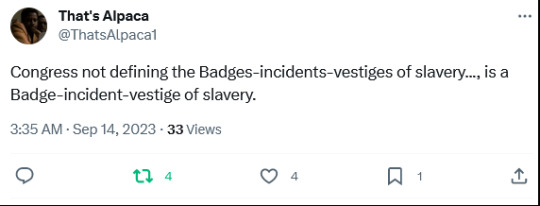
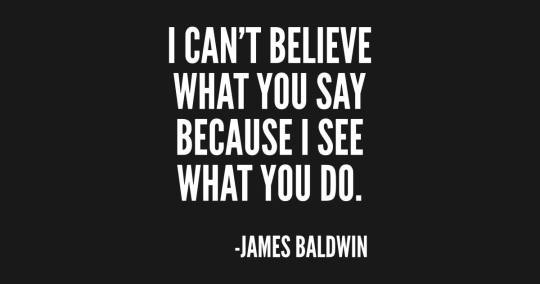
#Badges and Incidents of Slavery#Reparations#Vestiges of slavery#us congress#13th amendment#Black Freedmen#american lies#white lies
13 notes
·
View notes
Text
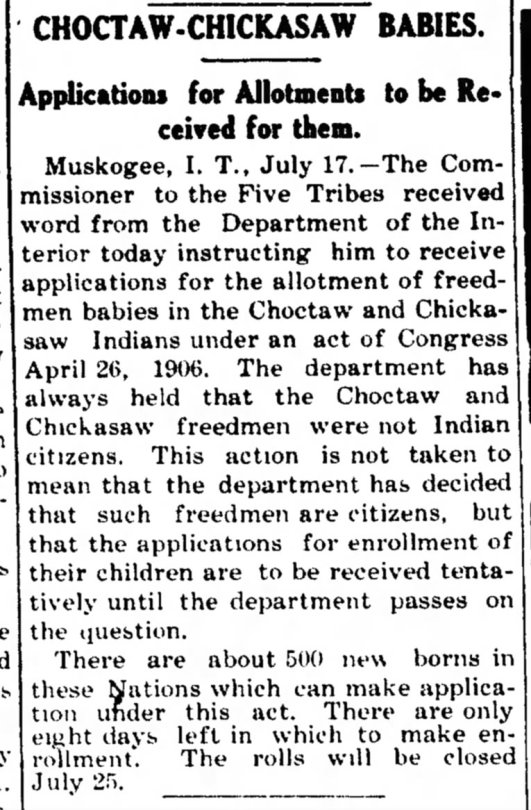
Here to say it's unfair that my family can't get benefits because of a marriage. Why does the mixed children today get full benefits. It's nothing wrong with. They deserve it. I'm speaking of my Ancestry. My great great granddaughter married a black man. I live in Oklahoma. The Native Americans act like wp. They are rude. I see white ppl getting benefits. It's always the black man losing. We fought just as hard as you did and more!! July 18,1906.
#native american tribes#native rights#chickasaw freedmen#equal right#chickasaw#black tumblr#black literature#black history#black history is american history
39 notes
·
View notes
Note
Hey CT! Have you heard about PB (Paschal Beverly) Randolph. He was a free black man and occultist! I've been reading up on him since I discovered his signature in a Freedman's Bureau record. I was wondering if you've read any of his work.
Oh yeah! He established the oldest Rosicrucian order in America! He's a pretty important figure tbh!
He was also one of the first people to ever try incorporating sexuality into Rosicrucian ritual magic, which was especially forward-thinking for 1850. A.E. Waite was an admirer of his work.
The American spiritualist movement was actually full of freedmen (especially women). Being an itinerant fortune teller and occultist was one of the few ways a young black person could make money without owning property or being married.
234 notes
·
View notes
Text
#our race#race#black#ebony#negro#negrito#swarthy#moor#enslaved#freedmen#africa#caribbean islands#caribbean#south america#central america#indigenous#indigenous to the world#native#native americans#indigenous people#indigenous history#first nations#afro latinas#afro latinos#one drop rule#our land
10 notes
·
View notes